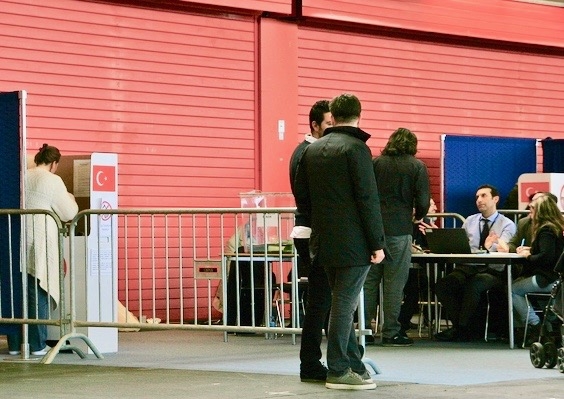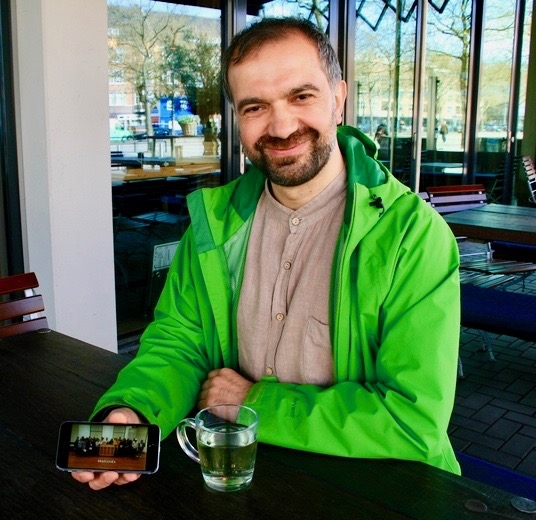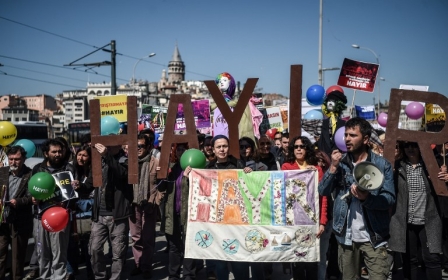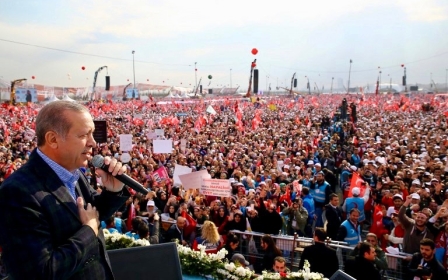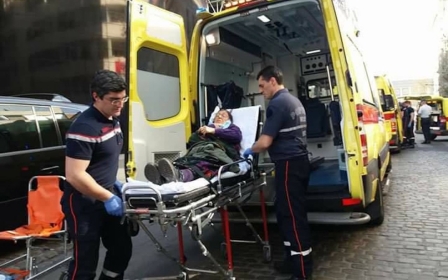Dutch-Turks cast ballots on boosting Erdogan's powers
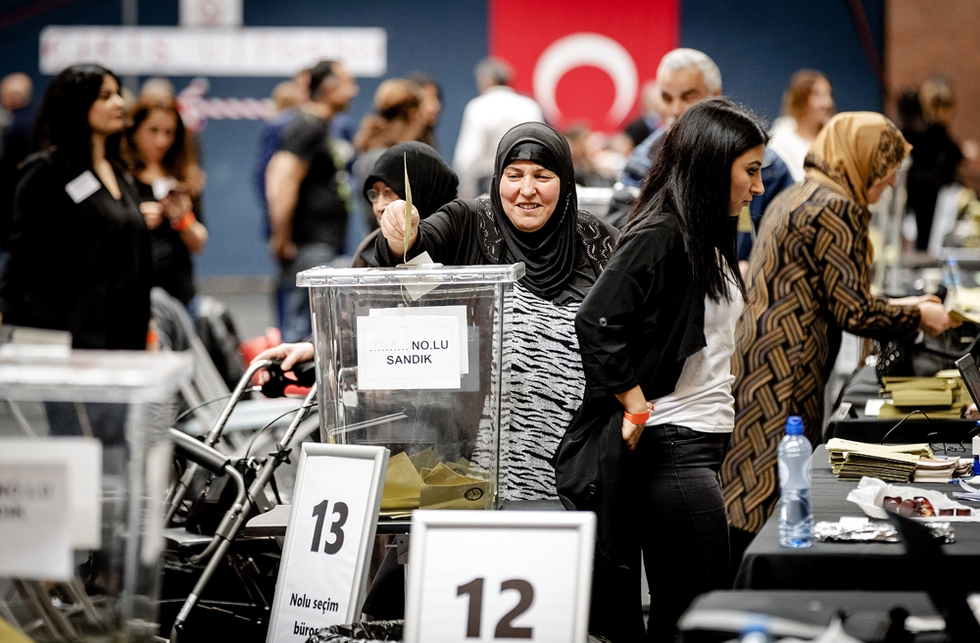
Amsterdam - Dutch-Turks went to the polls this week as part of a closely watched Turkish referendum on a constitutional shake-up that would grant President Recep Erdogan sweeping new powers, amid fears of a repeat of the violence seen in Brussels during voting there last week.
Still, the atmosphere was relaxed on Saturday at Amsterdam's polling booth in the RAI convention center, one of three across the country where about 250,000 Dutch citizens with Turkish passports were eligible to vote.
Many came with their families. Inside, people milled around greeting each other, chatting and drinking cups of tea after voting in special booths adorned with the Turkish flag, a far cry from the clashes that took place outside the Turkish consulate in the Belgian capital.
One of those planning to vote 'yes' to Erdogan's changes, which could allow him to stay in power until 2029, was Biram Jailen, a 46-year-old taxi driver.
"In politics, I think it's better that we have a longtime leader," he said as he walked towards the polling booth with a group of friends. "But I would not have it that this leader becomes a dictator later, I need to say that."
Emra Dagle, a Dutch-born 45-year-old, said he and his family were voting the same way.
"We are for Erdogan, so we voted 'yes'," he said, while accompanying his elderly parents to the booth. "He's a beautiful man, his heart is very beautiful."
The 18 amendments being proposed would scrap the role of prime minister, replace it with a vice president, and grant numerous additional privileges to the president, among other things. Proponents argue that it would streamline decision-making and make Turkey stronger, but critics say it would put too much power in Erdogan's hands.
Human Rights Watch have said the changes "profoundly undermine the country’s democracy," while the Venice Commission, the Council of Europe's advisory body on constitutional law, wrote that they would create "a presidential regime which lacks the necessary checks and balances required to safeguard against becoming an authoritarian one."
Although the Dutch are largely sceptical of the Turkish leader, particularly after his crackdown on opponents in the wake of last summer's military coup, there is a strong pro-Erdogan sentiment among voting Dutch-Turks, who automatically get a Turkish passport even if they were not born in Turkey.
In the 2014 presidential election, 78 percent picked Erdogan, although turnout was only about 7 percent. In the June and November general elections of 2015, Erdogan's AK Party won 64 percent and 70 percent of the vote respectively, with nearly half of all eligible voters turning out.
This is not about Erdogan. There shouldn't be anyone in any country with this power
-Selim Dogru
But there are also voices of dissent.
Despite numerous reports of 'no' campaigners in Turkey - which is still in a state of emergency - being forcibly silenced, that does not appear to have happened in the Netherlands, although fears do seem to abound.
Selim Dogru, a 45-year-old composer and artist who moved to the Netherlands 20 years ago, gathered a group of Dutch-Turks to make a song urging people to vote 'hayir' or 'no,' with lyrics such as "Do you want democracy to die? No, no, no. Do you want there to be a dictator? No, no, no."
"I know many, many people who want to do something like this ... but everybody was afraid to be on camera," he said.
"This is not about Erdogan," he argued. "There shouldn't be anyone in any country with this power. Even if it is my father, I would say I don't want this."
Dogru is not alone in his opinions.
"I am going to say 'no' because I don't think that one man should be a leader for the coming 20 years," said Derya Stoffers, a 26-year-old from the city of Almere. "I think it's fair if other people get the chance to be a leader as well."
Amsterdammers Ali Kosa, 21, and Taha Sari, 20, agreed the changes Erdogan wants to make were a step too far.
"I read the 18 amendments and I think they're anti-democratic," said Kosa. "So I voted for 'no'."
"I'm against [the idea] that one person in Turkey gets all the power and he can decide everything," nodded his friend Sari. "I'm for more parties, that's the main reason I voted 'no'."
Both also mentioned the turbulent events in the Netherlands during the lead-up to the referendum. A diplomatic rift developed between the two countries after Turkish ministers were banned from visiting Rotterdam last month to drum up 'yes' votes.
That led to Erdogan accusing the Dutch of being "Nazi remnants," a protest by Dutch-Turks in the port city that ended in violence, and a breakdown in relations between the two NATO members.
"He [Erdogan] was saying some things before the referendum just to take some votes," said Kosa, shaking his head. "He's always doing that, and we know that game now. That's why we voted 'no'."
We are for Erdogan, so we voted 'yes'." He's a beautiful man, his heart is very beautiful
-Emra Dagle
Not everyone agrees.
"I don't think the Dutch government was fair in Rotterdam," said Taybe Basavce, a 26-year-old nurse who moved to the Netherlands when she was 11. "I was already going to vote 'yes' because he [Erdogan] is the leader of the last 15 years and he did a lot of things for Turkey ... That made me want to vote 'yes' more."
The referendum has come at a sensitive time in the Netherlands, not just because of the incident with Turkey, but also because it trails a highly divisive election in which issues of identity, Islam, shared values and integration were fiercely debated.
"Dutch-Turkish people have always identified very strongly with Turkey but it's become more visible because of tensions between Turkey and EU, so that dual identity is becoming much more complicated," said Saskia Bonjour, an assistant professor at the University of Amsterdam's Social Sciences Department who specialises in migration and citizenship in the Netherlands.
The recent events around the referendum only served to stir things up more, she added. "I think that politics is being waged over the backs of the Dutch-Turkish people, both by the Turkish government and the Dutch government."
The first three days of voting in the referendum saw nearly 70,000 cast their ballot across the Netherlands.
Voting closes on Sunday at 9pm local time. More than 850,000 citizens of European countries with Turkish passports have voted across Europe in the last few weeks, according to the Turkish Supreme Election Board.
Turkey will vote on 16 April.
New MEE newsletter: Jerusalem Dispatch
Sign up to get the latest insights and analysis on Israel-Palestine, alongside Turkey Unpacked and other MEE newsletters
Middle East Eye delivers independent and unrivalled coverage and analysis of the Middle East, North Africa and beyond. To learn more about republishing this content and the associated fees, please fill out this form. More about MEE can be found here.


